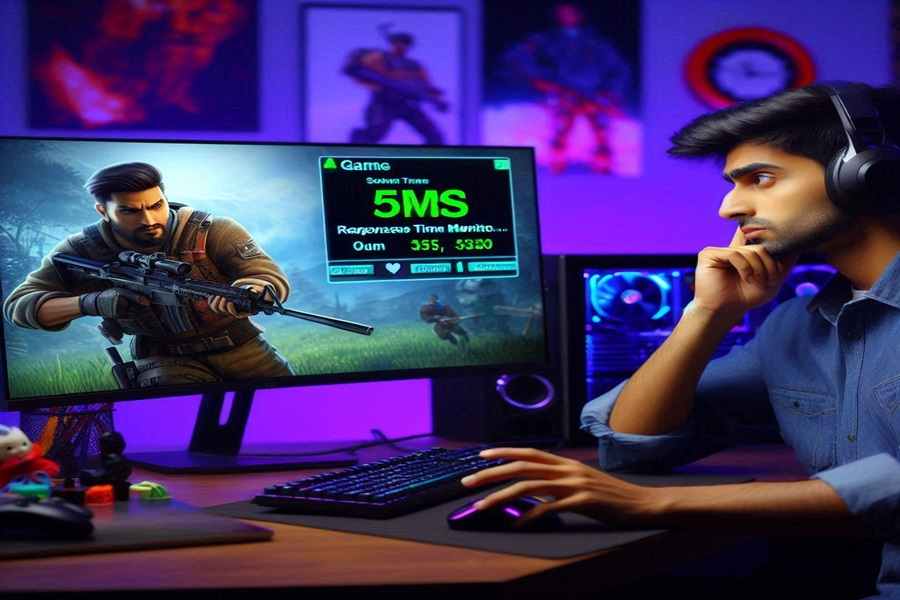
A 5ms response time on a monitor means it takes 5 milliseconds for pixels to change colors. This is crucial for reducing motion blur in fast-paced visuals.
Gamers and professionals often seek monitors with low response times. A 5ms response time is considered decent for most activities, including gaming and video editing. It ensures smoother transitions and a better visual experience. Lower response times are particularly important in competitive gaming, where every millisecond counts.
Monitors with 5ms response time strike a good balance between performance and cost. They offer adequate performance for casual to semi-professional use. Understanding response time can help in selecting the right monitor for your needs. Make sure to consider this spec when making your next purchase.
Decoding 5ms Response Time
Understanding monitor specifications can be confusing. One key term is 5Ms response time. This article will explain what it means and why it matters.
The Basics Of Response Time
Response time measures how quickly a pixel changes from one color to another. It is usually measured in milliseconds (ms). A lower number indicates a faster response time.
For example, a 5Ms response time means it takes 5 milliseconds for a pixel to change. This change could be from black to white or from one shade of gray to another.
| Response Time | Performance |
|---|---|
| 1ms | Very Fast |
| 5ms | Moderate |
| 10ms | Slow |
Importance In Monitor Performance
Response time affects how smooth a display looks. A slower response time can cause ghosting or blurring. This is especially noticeable in fast-moving scenes or games.
For gamers, a 5Ms response time is usually acceptable. It provides a balance between performance and cost. Professional gamers might prefer 1ms for the best experience.
In everyday use, a 5Ms response time is fine. It is suitable for tasks like browsing, watching videos, and office work.
- Good for general use
- Adequate for casual gaming
- Less ideal for professional gaming
Understanding response time helps you choose the right monitor. Remember, 5Ms response time is a balanced option for many users.

Measuring Monitor Response Time
Understanding monitor response time is crucial for gamers and graphic designers. It affects how quickly the screen updates with new images. A fast response time reduces motion blur and ghosting, providing a smoother visual experience.
Different Types Of Response Measurements
There are several ways to measure response time. The most common ones include:
- Gray-to-Gray (GtG): Measures the time it takes for a pixel to change from one shade of gray to another.
- Black-to-White (BtW): Measures the time for a pixel to change from black to white and back to black.
- Motion Picture Response Time (MPRT): Measures the time a pixel is visible on the screen.
Tools And Methods Used
Various tools and methods help measure response time accurately:
- Specialized Software: Programs like Blur Busters UFO Test can measure response time.
- Professional Equipment: Devices such as photodiodes can capture the exact time a pixel changes.
- Manual Testing: Observing the screen with high-speed cameras can also help.
| Measurement Type | Description |
|---|---|
| Gray-to-Gray (GtG) | Time for a pixel to switch between gray shades. |
| Black-to-White (BtW) | Time for a pixel to switch from black to white and back. |
| Motion Picture Response Time (MPRT) | Time a pixel is visible on the screen. |
Knowing these measurements helps you choose the right monitor. A monitor with a 5ms response time is generally good for most uses. Faster response times are better for gaming and fast-paced activities.
Impact On Gaming And Professional Use
Understanding the 5ms response time on a monitor is essential. This response time can affect both gamers and professionals.
Experience For Gamers
Gamers need fast response times. A 5ms response time helps reduce motion blur. This makes fast-paced games look smoother.
- Improved visual clarity: Objects in motion are clearer.
- Better reaction time: Players can respond quickly.
- Reduced ghosting: Less image trailing during movements.
A table can illustrate the impact better.
| Response Time | Impact on Gaming |
|---|---|
| 1ms | Best for competitive gaming |
| 5ms | Good for casual gaming |
| 10ms | Not ideal for fast-paced games |
Implications For Graphic Designers And Video Editors
For graphic designers and video editors, a 5ms response time is generally acceptable. It ensures smooth transitions and accurate colors.
- Color Accuracy: Essential for design work.
- Image Clarity: Important for detailed edits.
- Video Smoothness: Crucial for seamless video editing.
Professionals often prefer lower response times. This can further enhance their work quality.
Comparing Monitor Technologies
When exploring monitors, understanding the response time is crucial. The response time impacts your gaming and video experience. A common question is, “What is 5ms response time on a monitor?”
Tn Vs Ips Vs Va Panels
Monitors come with different panel technologies. The three primary types are TN (Twisted Nematic), IPS (In-Plane Switching), and VA (Vertical Alignment) panels. Each offers unique features and benefits.
TN Panels:
- Fast response times – often the fastest among the three.
- Commonly have a response time of 1ms to 5ms.
- Lower color accuracy and narrower viewing angles.
IPS Panels:
- Superior color reproduction and wider viewing angles.
- Response times usually range from 4ms to 8ms.
- Favored by graphic designers and photographers.
VA Panels:
- Balanced color accuracy and better contrast ratios.
- Response times typically between 5ms to 10ms.
- Ideal for watching movies and general use.
How Response Time Varies Across Technologies
The response time indicates how fast a pixel changes color. This is essential for reducing motion blur and ghosting in fast-paced content.
| Panel Type | Typical Response Time | Best For |
|---|---|---|
| TN | 1ms – 5ms | Competitive gaming |
| IPS | 4ms – 8ms | Color-critical work |
| VA | 5ms – 10ms | Watching movies |
TN panels are known for their quick response time, making them perfect for gamers. IPS panels provide vivid colors and better viewing angles, making them a favorite among creatives. VA panels offer a middle ground with good color and contrast, suitable for everyday use.

Improving Your Monitor’s Response Time
Improving your monitor’s response time can make a big difference in your gaming or work experience. A faster response time means smoother visuals and less motion blur.
Adjusting Settings For Optimal Performance
Adjusting your monitor settings can significantly enhance response time. Here are some key settings to tweak:
- Refresh Rate: Set your monitor to its highest refresh rate. Higher rates reduce lag.
- Response Time Overdrive: Enable this feature if available. It can improve the pixel response time.
- Game Mode: Activate game mode settings. These often optimize performance for fast-paced activities.
- Resolution: Lowering the resolution can sometimes improve response time. Test different settings for the best balance.
Choosing The Right Monitor For Your Needs
Choosing the right monitor is crucial for achieving optimal response time. Here are some factors to consider:
| Feature | Recommendation |
|---|---|
| Response Time | Look for monitors with a response time of 5ms or lower. |
| Panel Type | TN panels often have better response times than IPS panels. |
| Refresh Rate | Choose monitors with refresh rates of 120Hz or higher. |
| Adaptive Sync Technology | Monitors with G-Sync or FreeSync provide smoother gameplay. |
Identify your primary use for the monitor. Gaming, graphic design, and general use have different requirements. A gaming monitor should have a high refresh rate and low response time.
Graphic designers may prioritize color accuracy over response time. General users might look for a balance between features and cost.
Test and compare different monitors. Visit stores or read detailed reviews online. This ensures you find the best monitor for your specific needs.
Frequently Asked Questions
Is A 5ms Response Time Good?
Yes, a 5ms response time is good. It provides smooth visuals and is suitable for gaming and general use.
Which Is Better, 1ms Or 5ms?
1ms is better for fast response times, especially in gaming. It offers smoother visuals and reduced motion blur.
What Is A Good Response Time For A Monitor?
A good response time for a monitor is 1 to 5 milliseconds. Faster response times reduce motion blur and ghosting.
Which Is Better 5ms Or 8ms?
5ms response time is better than 8ms. It offers smoother visuals and reduces motion blur, ideal for gaming and fast-paced activities.
Conclusion
Choosing a monitor with 5ms response time enhances your gaming and work experience. It ensures smooth visuals and reduces motion blur. This feature is vital for gamers and professionals alike. Always consider response time when purchasing a monitor. It can significantly improve your overall viewing experience and productivity.

Wyatt Foster is a seasoned gaming and tech writer known for her engaging writing style and in-depth analysis of the latest monitors. With a keen eye for design and a love for all things pixelated, he guides readers through the ever-evolving landscape of gaming displays, making complex concepts accessible to both tech enthusiasts and casual gamers.